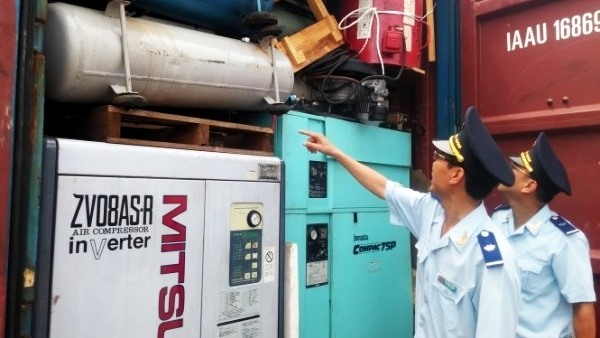As Viet Nam heavily imported machinery and equipment from China, experts worried that Viet Nam might become a landfill of outdated technologies, urging measures to tighten the import of second-hand machinery and equipment.

Viet Nam relies heavily on imported machinery and equipment from China, and experts are worried the country might become a landfill of outdated technologies, urging measures to tighten the import of second-hand machinery and equipment.
Updates from the General Department of Customs showed that Viet Nam spent more than US$30.6 billion on importing machinery and equipment from January–November, nearly 40 per cent of which was from China.
On average, Viet Nam spent $1 billion per month on machinery and equipment from China.
At the same time, Viet Nam’s machinery and equipment imports from Korea ranked second with a value of $5.6 billion, followed by Japan with $4 billion.
Imports from China rose 9.5 per cent during the period, while imports from other countries in the top five did not see any significant increases.
China was in a race with the US and EU in the developing Industry 4.0, so a huge volume of outdated machinery and equipment must be eliminated during the process, according to experts.
This had caused concerns about China dumping outdated machinery and equipment in Viet Nam, economist Nguyen Tri Hieu said in Dien Dan Doanh Nghiep (Business Forum) online newspaper.
According to Vo Dai Luoc, former director of the Institute of World Economics and Politics, regulations were needed for the import of second-hand machinery and equipment.
Otherwise, the environment issue would be really alarming, Luoc said.
Luoc added high import taxes on second-hand machinery and equipment should be considered.
In addition, supervision of second-hand machinery and equipment imports was needed, especially in technology transfer, to ensure compliance with regulations.
Luoc said the long-term solution was for Viet Nam to renovate its industrial development strategy and focus on advanced technologies in manufacturing.
Viet Nam has set a target for hi-tech products to account for at least 45 per cent of the value of the manufacturing and processing industry by 2030.
A draft decision by the Prime Minister regulating the import of second-hand machinery and equipment has been posted for feedback on the Ministry of Science and Technology’s website.
According to the draft, Viet Nam would not allow the import of second-hand machinery and equipment from other countries if it was deemed outdated, poor quality or could cause pollution.
Only second-hand machinery and equipment which met safety, energy and environmental standards in accordance with the law would be allowed in.
The ministry is also studying amendments to Circular 23/2015/TT-BKHCN about imports of second-hand machinery and equipment which took effect on July 1, 2016. — VNS





